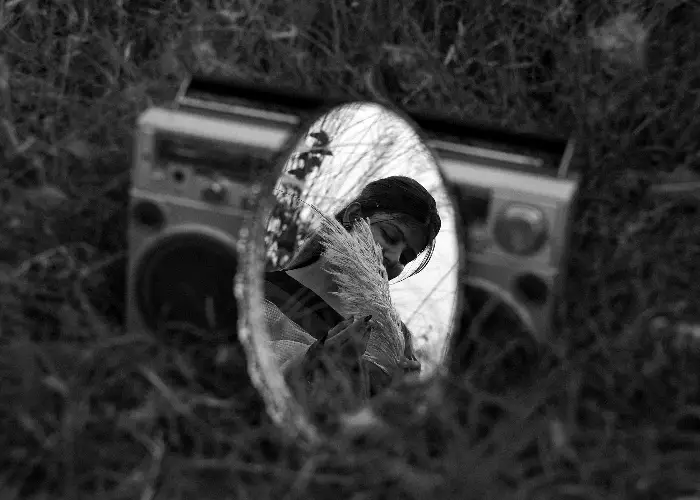Hook: Introduction to Feng Shui and Mirrors
Imagine you’re walking through a beautifully decorated house. Your eyes swiftly scan the exquisitely arranged interiors, but suddenly, you’re drawn to a peculiar item – a strategically placed mirror on the wall. You wonder, why is that here? This isn’t any random decor choice; it’s an integral instrument in the ancient Chinese art of feng shui.
Feng Shui is all about harnessing and promoting healthy ‘chi’ or energy flow within your living space to enhance positivity and prosperity in life. Now think about mirrors, reputed across cultures as reflectors not only of our physical selves but also our soul’s essence. In feng shui, mirrors possess unique abilities to adjust the energy flow in spaces they inhabit.
But did you know there’s more than just one type of mirror used in Feng Shui practice? Yes! The application of convex and concave mirrors can have differing impacts on space depending on their use.
So let’s delve into this fascinating world where everyday objects become vessels of positive energy adjustment! How do we use these differently shaped reflectors correctly? And more importantly – which could potentially reflect ‘bad’ Feng Shui if wrongly placed? Read on for some illuminating insights!

Understanding Convex Mirrors in Feng Shui
In Feng Shui, the type of mirror you select can dramatically enhance or disrupt the energies of your dwelling. Among these, convex mirrors carry a unique significance. Shaped like an outward curve or ‘bubbles,’ convex mirrors extend a panoramic view, covering larger areas than their flat counterparts could reflect.
Convex mirrors in Feng Shui are prominent tools often placed outside homes or commercial buildings for broader protection. Their ‘expanding’ characteristics push away negative energy and prevent it from entering your space. Aptly nicknamed ‘bagua mirrors,’ after the eight-sided trigrams in Chinese philosophy representing fundamental principles of reality, they offer comprehensive safeguarding against external harmful influences.
Using a convex mirror requires careful attention to its positioning and orientation to effectively ward off negativity and attract prosperity. It’s beneficial to place them at significant points like entrances where they can “swallow” unhealthy chi emitted from negative surroundings such as cemeteries or hospitals nearby.
Remember: Feng Shui classifies energy into productive, destructive, and reducing cycles; awareness about these is integral while placing any tool including mirrors in your space to benefit from its positive aspects! Consider consulting with an expert if you are unsure about how best to use these magical reflectors for optimal feng shui balance.
Benefits and Uses of Convex Mirrors
Convex mirrors, due to their unique shape and reflective properties, carry several advantages in the realm of Feng Shui. Their most critical function is their ability to repel negative energy – any harmful chi being projected towards your home or workplace gets reflected back by this potent mirror. This redirection of bad energy helps maintain a clean and positive environment within your space.
One prevalent use of convex mirrors is for homes or offices with a direct view onto sharp corners or imposing structures, like towering buildings directly opposite your home’s main entrance. Placing a convex mirror here dissipitates the Sha Chi (killing energy) coming from such structures.
Likewise, they are beneficial if you’re living at the end of a road where speeding traffic heads straight towards your house; it’s seen as ‘rushing’ hostile energy aiming straight at your home. A well-placed convex mirror can shield you effectively by diverting this rushing chi.
Business owners often utilize these mirrors above their entrances to ward off competitor’s negative ‘jealousy’ energies while attracting more customers with an aura of welcoming positivity.
In essence, when correctly utilized under proper guidance, the powerfully protective nature combined with its expansive vision makes convex mirrors an invaluable asset in any Feng Shui toolkit. But remember! Over-use might repel positive influences as well; hence approaching utilization methodically benefits optimally.
Understanding Concave Mirrors in Feng Shui
Switching our focus from convex mirrors, let’s delve into the distinct purpose and application of concave mirrors in Feng Shui. Unlike their convex counterparts, concave mirrors are shaped inward like a bowl and have a unique way of manipulating energy.
The reflective surface on these mirrors concentrates chi rather than dispersing it. They absorb negative influences, hold them in their ‘bowl,’ decreasing their harmful impact instead of reflecting away like convex ones. Think of these reflectors as ‘softening’ tools that diminish any potently severe energies being targeted at your dwelling or workplace.
Particularly useful when there’s an aggressive structure looming over your living space, concave mirrors can effectively neutralize this oppressive energy by capturing and containing it within its curved reflection surface.
A specific case for deploying a concave mirror might be living under the shadow of a taller building or facing an imposing structure causing Illness Star (also known as ‘star 2’). The rounded mirror can help filter out this potentially detrimental force while neutralizing its harmful effects on building occupants.
As intriguing as they may seem, practitioners suggest reserved use since they only contain curses instead of completely deflecting them away. Seeking an expert’s advice while dealing with strong afflictions certainly helps maximize benefits from these feng shui instruments.

Benefits and Uses of Concave Mirrors
Delving into the benefits concave mirrors can bring when applied with care in Feng Shui; these ‘softening’ mirrors concentrate and transform harsh energy into a more manageable form. Their inward curved surface plays an essential role in reducing the impact of damaging influences.
Primarily, a concave mirror should be used to neutralize harsh energies emanating from tall, overpowering structures that loom over your dwelling and potentially disturb harmonious chi flow within your space. Positioning one such mirror where it captures the reflection of an imposing structure can help analyse and soften this destructive energy.
Retail outlets can make excellent use of concave mirrors, especially when facing aggressive competition from larger stores nearby. Just like David taming Goliath, a well-placed concave mirror would capture any negative energy from larger competitors and curtail it down to size!
Additionally, living at T-junctions or cul-de-sacs often means facing constant traffic pointing directly at home – interpreted as bad Feng Shui due to rushing forces aiming at you. A strategically positioned concave mirror here weakens this otherwise sharp negative chi.
However, ensure not to overuse this potent tool – frequent exposure might start containing positive energy influx as well! Feng Shui practices always advocate balance; knowing exactly where and when to apply these power-packed mirrors aligns best with your spatial energies.
Common Mirror Misconceptions in Feng Shui
Navigating through Feng Shui’s vast ocean of knowledge, it’s no surprise that misconceptions exist about mirror usage in this ancient practice. Let’s shine a light upon these myths and unravel fact from fiction.
Firstly, many presume that all mirrors hold the same value in Feng Shui. However, the shape of your mirror – be it round, square, convex or concave – plays a pivotal role in manipulating energy within your space. They serve varied purposes and can’t be arbitrarily interchanged.
Another misconception is indiscriminate use without considering their impact or appropriate positioning. Mirrors are anything but mere decorative elements; they are fundamental energy adjusters! Therefore reckless placement might invite unwanted negative chi into your surroundings instead of evoking positivity.
A common myth suggests mirrors should face entrances to attract good fortune inside. Contrarily, traditional practitioners advise against this as it could reflect incoming positive chi back out of the door!
Thinking any bad chi could be deflected by simply hanging a bagua mirror outside is another fallacy. Bagua mirrors pack powerful symbolic implications and should rarely be used indoors nor without expert guidance to ward off extraordinarily pressing negative forces only.
Dispelling such misinterpretations helps balance fostering energies within our habitats effectively using Feng Shui recommendations. It bolsters understanding that while every principle has its boon when executed correctly, overlooking subtleties risks adverse consequences.

How to Choose and Position Your Feng Shui Mirror
Embarking on choosing and placing your Feng Shui mirror can be an invigorating yet challenging journey. Understanding the fundamental principles helps you harness mirror magic effectively.
Firstly, decide whether convex or concave mirrors align best with your needs based on the surrounding environment’s energy dynamics. Convex mirrors are best to scatter harmful chi invading from hostile structures, while concave ones neutralize potent direct forces by absorbing them.
Positioning is crucial for maximizing these protective mirrors’ benefits. They should ideally be hung outside facing towards negative energy sources. Note: Ensure they are placed high enough to reflect incoming ill fortunes but not directly at eye level.
If inside positioning becomes necessary, consider placing a mirror where it can expand confined places or deflect disruptive energy from sharp corners within rooms. Remember not to place them across entrances as they bounce off good luck entering homes!
Overlooking a harmonious home object with positive connotations enhances chi redistribution as well; reflecting a vase full of thriving green plants doubles prosperity implied by vegetation health and growth!
The key here is intention – positioning your mirrors while focusing positive intentions amplifies their effectivity in adjusting energies favorably much like prayer wheels in Buddhist traditions.
Lastly, always prioritize expert assistance since these potent tools navigate complex energetic exchanges that we wouldn’t want to destabilize unintentionally! Smart application maximizes good fortune influx through this deep-rooted Chinese practice.
Summary: Balancing Energy with the Right Mirror
Navigating through the mystic Feng Shui world, we’ve unravelled how concave and convex mirrors are potent energy regulators within any inhabited space.
An understanding of your dwelling’s architectural complexities, neighboring physical structures, and inherent energy dynamics will help decide if a curved outward or inward mirror is needed. Meanwhile, mindfulness during placement ensures these mirrors function optimally in their defensive roles.
Keep the principle of balance at heart; neither type of mirror should be overused or haphazardly applied since effective Feng Shui implementation relies on harmonious interaction among all environmental elements.
Clear misconceptions and correct planning go a long way to ensure that your chosen mirror supports you most fruitfully. Remember that interiors filled with positive Chi promote wellbeing and prosperity at home or workspace!
Whether warding off potentially harmful energies with a convex mirror’s expansive reach or neutralizing dominant forces using the absorbing nature of concave counterparts – understanding their appropriate use upholds an environment that fosters peace and positivity.
So equip yourself wisely with this ancient wisdom: translate it into action mindful both about its rewarding potential when executed correctly while being cautious about unintended negative consequences from incorrect application! Happy harmonizing!

Sign up